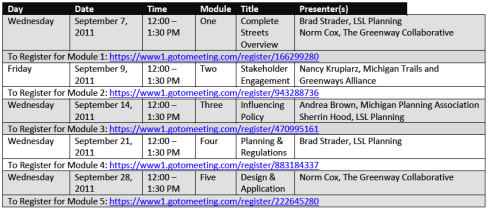You are currently browsing the tag archive for the ‘Trainings & Events’ tag.
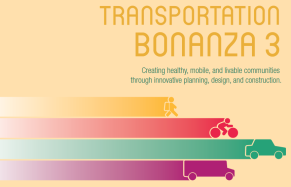 The Michigan Association of Planning, in partnership with the Michigan Safe Routes to School (SR2S) Program, the Michigan Department of Transportation (MDOT), the Michigan Department of Community Health (MDCH), and the Michigan Municipal League (MML), is launching its 3rd annual Transportation Bonanza! This event was designed to bring together professionals from the fields of planning, education, transportation, health, engineering, natural resource and environmental protection, architecture, landscape architecture, and others to align around the topic of community building for health and accessibility.
The Michigan Association of Planning, in partnership with the Michigan Safe Routes to School (SR2S) Program, the Michigan Department of Transportation (MDOT), the Michigan Department of Community Health (MDCH), and the Michigan Municipal League (MML), is launching its 3rd annual Transportation Bonanza! This event was designed to bring together professionals from the fields of planning, education, transportation, health, engineering, natural resource and environmental protection, architecture, landscape architecture, and others to align around the topic of community building for health and accessibility.
We think that this year’s focus on the crossroads of schools and communities might appeal to your membership, constituents, partners, and/or staff. Transportation Bonanza 3 will deliver national and state experts to explore school facilities planning, how to implement Safe Routes to School successfully, collaborations between school districts and communities, public policies that impact the education system, and more.
Through valuable partnerships, the Transportation Bonanza series has continued to evolve from general transportation topics in its inaugural year to this year’s conference focusing on understanding the relationships between schools, community, and transportation; Safe Route to School; and Complete Streets. The benefits of attending are many and
include:
- Learning about the intricacies and interconnectedness of communities, public health, schools, and transportation
- Being better equipped to work with colleagues across multiple disciplines
- The registration price is a good value for the information provided
- Networking with colleagues across multiple disciplines
Just as the road networks we use to transport ourselves and our goods across multiple jurisdictions and cut through a variety of landscapes, so too do transportation planners, engineers, and advocates work with and through a variety of disciplines to enhance and improve our road systems. While each session is designed to relate to transportation in a unique way, from the relationship to schools to local government funding, there is an entire track dedicated to Context Sensitive Solutions and Complete Streets.
Date: February 16, 2012
Location: Lansing Center, Lansing
8:00 AM to 5:15 PM
Program: A full day of national experts and local perspectives, includes lunch, instruction, and refreshments.
Registration: $49 and online at http://planningmi.org/tb.asp
UPDATE: @WalkBikeRollMI We’re excited about the webinar, but it’s unfortunately not open to general public. Looking into ways to offer it more widely.
 December 1, 2011, 2:00 p.m. Eastern
December 1, 2011, 2:00 p.m. Eastern
A common concern in transportation agencies is that implementing Complete Streets policies will cost too much. This in-depth, hour and a half long webinar will provide several strategies for responding to this concern, including examples and resources from communities that have overcome this issue. The webinar will provide Communities Putting Prevention to Work (CPPW) teams with information both about the low cost of many complete streets treatments, as well as ways to talk to transportation professionals about the added value and community support that result from complete streets implementation.
CONTACT: Jeff Cranson, MDOT Director of Communications, 517-335-3084
MDOT promotes on-road bicycling facilities
August 19, 2011 — The Michigan Department of Transportation (MDOT) is sponsoring “Training Wheels” courses around the state designed to educate communities interested in providing on-road bicycle facilities for their residents and visitors. The five-hour course includes both classroom and outdoor instruction.
The courses will be offered in the following areas:
- Sept. 12 in Three Rivers ([email protected])
- Sept. 13 in Dewitt Township ([email protected])
- Sept. 14 in Big Rapids ([email protected])
- Sept. 15 in Park Township/Holland ([email protected])
- Sept. 26 in Dearborn ([email protected])
- Sept. 27 in Berkley ([email protected])
- Sept. 28 in Rochester ([email protected])
- Sept. 29 in Lapeer ([email protected])
“Training Wheels” is designed to show communities how to integrate bike facilities into existing infrastructure to make bicycling safe and convenient, providing alternate transportation that make roads more complete for everyone. Classroom instruction using a guide produced by the American Association for State Highway Officials (AASHTO) is followed by an on-road, on-bike portion. The outdoor segment provides participants a firsthand look at the benefits of providing an alternative mode of travel that does not require expensive facilities for communities to build or maintain.
The “Training Wheels” courses are intended for city, township and county managers; council members; engineers; and related design and planning staff. Registration is required. A bicycle and helmet also are required and may be rented; bicycles and helmets must be ordered in advance. Registration deadlines vary with locations. For details, contact Cynthia Krupp at 517-335-2923, or by e-mail at [email protected].
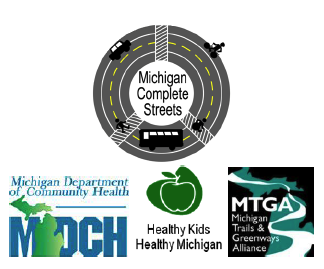 Complete Streets Institute (CSI): A Need for Information
Complete Streets Institute (CSI): A Need for Information
In response to the successful passage of the Complete Streets legislation, and increasing demand from interested communities and organizations, the Healthy Kids, Healthy Michigan (HKHM) Coalition, Michigan Department of Community Health (MDCH), and Michigan Trails and Greenways Alliance (MTGA) partnered to develop the Complete Streets Institute. The Complete Streets Institute is a comprehensive and standardized 5-module training program designed to increase awareness of complete streets principles, support local advocacy efforts, and provide practical, realistic instructions and techniques to help communities create, adopt, and implement Complete Streets policies and projects.
The 5-module Complete Streets Institute training curriculum was designed to cover all aspects of Complete Streets, from introduction of the concept (Module 1) to design applications in your community (Module 5). You pick the modules YOUR community needs to move ahead with success.
Lunchtime Webinar Series
Register for Module 1 (September 7)
Register for Module 2 (September 9)
Register for Module 3 (September 14)
Register for Module 4 (September 21)
Register for Module 5 (September 28)
Webinar System Requirements:
PC-based attendees Required: Windows® 7, Vista, XP or 2003 Server
Macintosh®-based attendees Required: Mac OS® X 10.5 or newer
Who Should Attend
Community health professionals, bike and trail advocates, disability rights advocates, professional community planners, engineers and designers, local government staff and officials, state agency professionals (MDOT, MDCH, MSHDA, others), school leaders, non-profits, and anyone with an interest in advancing Complete Streets in Michigan.
 After being featured on Streetsblog DC last week, we are pleased to inform our readers of an upcoming Training Wheels: On-Road Bicycle Facility Design Training, that will take place in Rochester, MI September 28, 2011.
After being featured on Streetsblog DC last week, we are pleased to inform our readers of an upcoming Training Wheels: On-Road Bicycle Facility Design Training, that will take place in Rochester, MI September 28, 2011.
WHAT:
Training Wheels is an educational course on the planning and design of on-road bicycle facilities sponsored by the Michigan Department of Transportation (MDOT). It will consist of two hours of classroom instruction on the AASHTO Guide for the Development of Bicycle Facilities, followed by an on-road, on bike portion. During this portion we will casually ride through the community, analyzing types of on-road facilities available. There will be many stops to point out potential facility types, followed by a group exercise and discussion, questions from participants and a brief wrap-up.
WHO: This course is for City, County, Township, Village and MDOT managers, engineers, planners, City Councils, DDA staff, Chamber of Commerce and other stakeholders that can help communities educate others and adopt on-road bicycle facilities.
WHERE:
Stoney Creek Schoolhouse
1051 Washington Road
Rochester, Michigan 48306
WHEN:
September 28, 2011
9:00 a.m. – 2:30 p.m.
TO REGISTER: Email Nina Misuraca Ignaczak at [email protected]
MORE INFO:
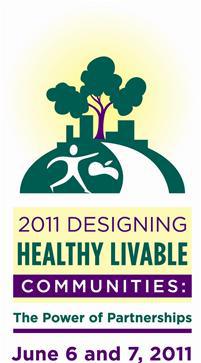 June 6-7, 2011
June 6-7, 2011
The Lansing Center, Lansing, MI
Presented by the Michigan Department of Community Health
The fifth Designing Healthy Livable Communities Conference will feature national and Michigan experts to address how the Power of Partnerships can enhance the collaborative efforts of communities and policy makers to create and maintain healthy Michigan communities.
On the afternoon of June 6th, there will be three pre-conference trainings: Community Visioning, Complete Streets and Food Policy Councils.
On June 7th, two nationally renowned keynote speakers will present: Majora Carter, Eco-Entrepreneur and President of The Majora Carter Group will open the conference with the keynote presentation, “You Don’t Have to Move Out of Your Neighborhood to Live in a Better One.” Tyler Norris, a long time social entrepreneur whose passion is improving the health of people and the sustained vitality of built and natural environments, will provide the second keynote. A choice of six workshops and two concurrent plenary sessions will also be featured.
To register, go to: https://www.regonline.com/2011dhlcconference
For additional information on sponsorship and exhibits, contact the Conference Coordinator, Diane Drago at [email protected] or 517-663-5147.
In response to the successful passage of Michigan’s Complete Streets legislation, and increasing demand from interested communities and organizations, the Healthy Kids, Healthy Michigan (HKHM) Coalition, Michigan Department of Community Health (MDCH), and Michigan Trails and Greenways Alliance (MTGA) partnered to develop the Complete Streets Institute.
The Complete Streets Institute is a comprehensive and standardized 5‐module training program designed to increase awareness of complete streets principles, support local advocacy efforts, and provide practical, realistic instructions and techniques to help communities create, adopt, and implement Complete Streets policies and projects. The 5‐module Complete Streets Institute training curriculum was designed to cover all aspects Complete Streets, from introduction of the concept (Module 1) to design applications in your community (Module 5). You pick the modules YOUR community needs to move ahead with success. See the PDF below for more details.
The Department of Health & Wellness Promotion is hosting a Complete Streets workshop to discuss walking, biking and transportation in Detroit on March 31, 2011, from 6:00 - 8:00 pm. The event is free and dinner will be provided by Slows BBQ compliments of the Complete Streets Coalition. Featured Guest Speaker will be Richard Wooten, Extension Educator at MSU. More details below:
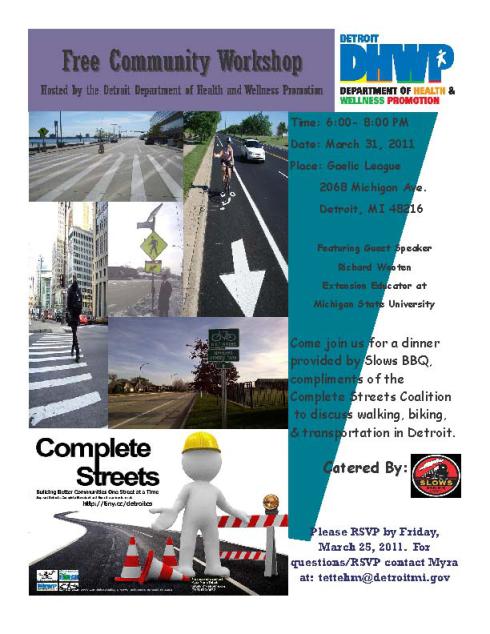
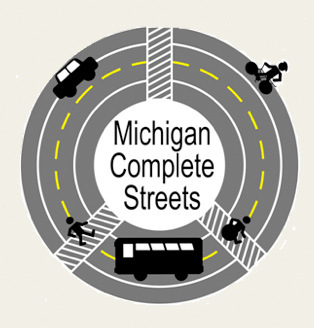 On Friday, January 28, the Michigan Department of Community Health and Michigan Trails and Greenways Alliance launched the Complete Streets Institute. The Complete Streets Institute is a 5-module training series on Complete Streets spanning the basics of how to implementing projects. One hundred trainers, including bike, disabilities, and trail advocates, community officials, county health department staff, MSU Extension specialists, and transportation planners and engineers converged upon Lansing to receive a specialized, day-long training.
On Friday, January 28, the Michigan Department of Community Health and Michigan Trails and Greenways Alliance launched the Complete Streets Institute. The Complete Streets Institute is a 5-module training series on Complete Streets spanning the basics of how to implementing projects. One hundred trainers, including bike, disabilities, and trail advocates, community officials, county health department staff, MSU Extension specialists, and transportation planners and engineers converged upon Lansing to receive a specialized, day-long training.
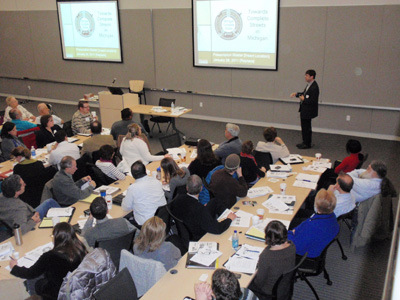 Brad Strader of LSL Planning presented the introductory and influencing policy modules, while Nancy Krupiarz of Michigan Trails and Greenways Alliance presented the stakeholder engagement module. The 100 trainers plan to take the information back to their constituents and jurisdictions. Several agencies and organizations will be launching Complete Streets Institute trainings across the state in the coming months. Stay tuned for dates and a location near you! For information about the Complete Streets Institute or trainers, please contact Holly Madill, MDCH Complete Streets Project Coordinator, at [email protected] or (517) 335-8372.
Brad Strader of LSL Planning presented the introductory and influencing policy modules, while Nancy Krupiarz of Michigan Trails and Greenways Alliance presented the stakeholder engagement module. The 100 trainers plan to take the information back to their constituents and jurisdictions. Several agencies and organizations will be launching Complete Streets Institute trainings across the state in the coming months. Stay tuned for dates and a location near you! For information about the Complete Streets Institute or trainers, please contact Holly Madill, MDCH Complete Streets Project Coordinator, at [email protected] or (517) 335-8372.
To date and our knowledge, 26 Michigan communities have passed Complete Streets policies (resolutions or ordinances), the most in the nation. If the population of all of those communities is added up, over 2,194,607 residents, or 22% of the state’s population, live under local Complete Streets policies that seek to provide its residents with transportation choices, more opportunities for physical activity, and a vibrant community.
| Module Title | Description |
| 1-Overview of Complete Streets | This module defines Complete Streets and explains its importance, history, and benefits, as well as its relationship to other associated topics. |
| 2-Stakeholder Engagement
|
This module introduces the various stakeholders of Complete Streets, explains how to work through a coalition to effect policy and projects, and provides messaging and communication tools and tips. |
| 3-Influencing Policy |
This module provides the tools needed to assess a community’s readiness for Complete Streets policies and the steps a community would take to implement them. In addition, the module defines and explains the policy-making processes and stakeholders, and Complete Streets laws. |
| 4-Complete Streets Planning and Regulations | This module explains policy implementation tools such as planning processes, policies, and regulations. |
| 5-Complete Streets Applications and Design | This module explains the design elements and various treatments/applications used to accomplish Complete Streets policy implementation (sidewalks, bike paths, transit stops, road diets, etc.) through project design. |
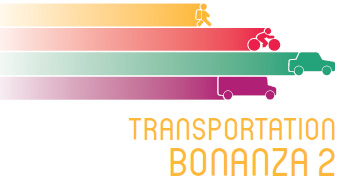 The Michigan Association of Planning, in partnership with the Michigan Department of Community Health, Michigan Department of Transportation, Michigan Safe Routes to School program, Michigan Municipal League, and the MI Chapter – Congress for New Urbanism, is launching its second annual Transportation Bonanza! Slated for December 8 (Lansing Center) and 9th (Lansing Radisson), this comprehensive, multidisciplinary workshop provides the programming necessary to integrate land use and transportation policies with health and mobility agendas, and responds to the recent passage of complete streets legislation, which made Michigan the 14th state to embrace this integrated approach to planning, design and construction of transportation networks which provide safe, attractive and comfortable access for ALL users, from bicyclists and pedestrians, to the elderly and disabled, busses and trains, and the automobile.
The Michigan Association of Planning, in partnership with the Michigan Department of Community Health, Michigan Department of Transportation, Michigan Safe Routes to School program, Michigan Municipal League, and the MI Chapter – Congress for New Urbanism, is launching its second annual Transportation Bonanza! Slated for December 8 (Lansing Center) and 9th (Lansing Radisson), this comprehensive, multidisciplinary workshop provides the programming necessary to integrate land use and transportation policies with health and mobility agendas, and responds to the recent passage of complete streets legislation, which made Michigan the 14th state to embrace this integrated approach to planning, design and construction of transportation networks which provide safe, attractive and comfortable access for ALL users, from bicyclists and pedestrians, to the elderly and disabled, busses and trains, and the automobile.
Communities that create a culture that embraces transportation options for all users not only expands access to services and encourages healthy lifestyles, but also lowers traffic congestion, attracts and retains residents and businesses, supports mixed use and compact development, promotes economic development, and improves equity in transportation. Learn how YOUR community can enhance its livability, add value to residents, and attract investment by integrating elements that create vitality.
Learn what you can do locally to implement policies and programs that can transform your community, from DAY 1’s national livability experts Michael Ronkin, Harrison Rue, and Scott Windley to Day 2’s ITE Manual authorities Phil Caruso, Brian Bochner and G. Wade Walker.
Whether you are seeking a multi dimensional, motivating, and practical experience, or a technical guide for innovative applications - or BOTH - you will find value, inspiration and skills at MAP’s TB2.
Follow this link for online registration and to view the program brochure, with details about keynote speakers, session descriptions, and mobile workshops.

